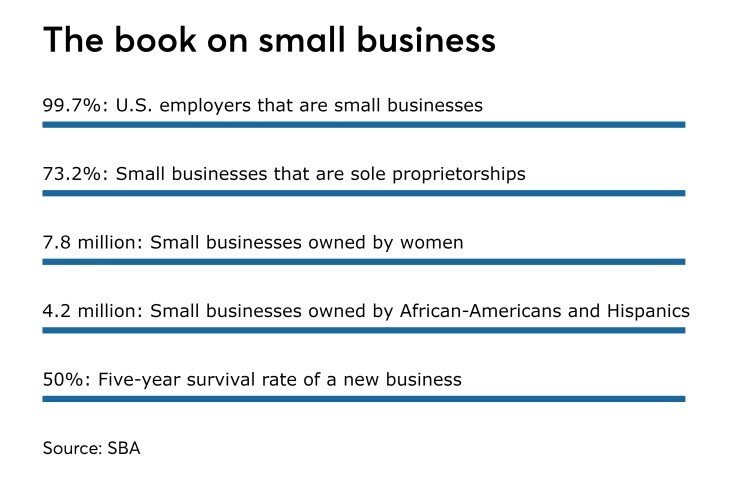TD Bank believes it may be able to court more small businesses by helping their owners manage money more effectively.
The $291 billion-asset unit of TD Bank Group in Toronto has agreed to invest $3 million over the next three years as part of a partnership with the National Foundation for Credit Counseling.
The most intriguing element of the pact, unveiled earlier this month, is its targeted audience. The partnership plans to use the funds to provide credit counseling to as many as 10,000 small businesses.

While programs targeting small business owners exist, the segment still represents “an underserved market,” said Soneyet Muhammad, director of community engagement at Clarifi, a credit counseling agency in Philadelphia.
The project aims to help small business owners better manage their personal credit and to show them the risks of using consumer credit to finance their operations. One objective is to convince more entrepreneurs to replace consumer-oriented credit, such as credit cards and home-equity lines, with commercial loans.
“There’s a lot of opportunity for banks in general, but especially for TD, to work with the NFCC,” DesMarteau said. “If I take all the training I have at this bank and extend it to them, they’re going to be more powerful.”
The commitment comes at a time when TD Bank is investing heavily in small business banking. Earlier this year, it hired nearly 70 specialists to focus on businesses with less than $1 million in annual revenue.
Most of the nearly 16,000 counseling sessions that Clarifi conducted last year involved consumers who wanted to improve their credit scores or buy a home. Meanwhile, several banks have made
For TD Bank, the focus on small business owners came together after it reviewed some troubling data from one if its
In many cases, entrepreneurs were using consumer debt to finance their business ventures.
“There’s some lack of knowledge of what they’re getting into,” DesMarteau said.
“How confident are you that the equity you’re going to put into the infrastructure of the business is going to translate into income to be able to pay yourself back?” he added. “You can end up losing your equity if your business doesn’t perform, while impairing your personal finances, as well.”
The bank envisions a two-phase program that starts with enhanced education and one-on-one counseling, and growing into an effort to assist small business owners who use consumer financial products to finance their businesses.
TD’s money will pay for improved training materials for NFCC-affiliated credit counselors. It will also underwrite the cost of one-one counseling sessions.
Ideally, TD Bank would increase its commitment to the partnership after 2020, DesMarteau said.
“It’s the beginning of collaboration,” DesMarteau said of the partnership. “I can see it going on forever, frankly.”
A large number of Clarifi’s small business clients work for themselves full-time, or they augment a regular paycheck with a part-time venture, Muhammad said. Clarifi has also found that a significant percentage of its clients use personal credit to pay business expenses.
“It’s not unusual,” she said. “We see it all the time.”
A long-term problem with mingling commercial and consumer finances is that problems with the business can trigger major personal financial issues, including the loss of a home.
Blurring the line between personal and business finances can also cloud a venture’s true financial picture, said Marla Bilonick, executive director of the Latino Economic Development Center, a community development financial institution in Washington. Her group supports a number of day cares and cleaning businesses where comingled finances are commonplace.
“A lot of times there’s a misperception that a business can be profitable immediately,” Bilonick said. “Business owners are very knowledgeable about their sales, less so about profits and losses.”
Still, some entrepreneurs have to use personal credit, DesMarteau said.
“It’s okay if it’s the only way they can make things work,” DesMarteau said. “I just think they have to realize that they’re gambling.”
Ultimately, TD Bank hopes its efforts will create more cooperation among commercial banks, credit counselors, CDFIs and groups like the Small Business Administration’s SCORE program, a mentorship effort that pairs retired executives with entrepreneurs.
“Working together we can educate business owners a lot,” DesMarteau said. “It would be a nice ecosystem. I think it could make an impact in local communities.”
The effort, which could help deliver more loan-worthy commercial clients to lenders, already seems to have the support of some counseling agencies and CDFIs.
“I’m all for it,” said Bilonick, who noted that TD Bank funded an education event her group held earlier this year. “There aren’t any parallel groups we’ve established relationships with. … We’d love to have something that goes in both directions.”
“We welcome it,” Muhammad said. “It’s a great first start. I hope it keeps growing.”





